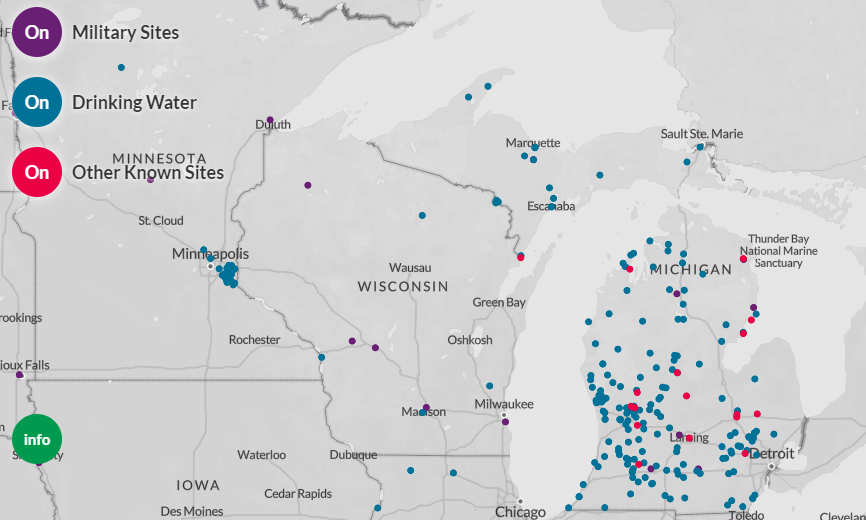By Jeffery L. Carey, Jr.
Recently, Congress has taken action designed to protect Flint and the rest of Michigan’s drinking water from PFAS chemicals. House Democrat Dan Kildee of Michigan’s 5th Congressional district is leading that effort and cosponsored legislation called The PFAS Action Act.
In a conference call town hall this week, Kildee described the bill he co-sponsored, along with efforts in general to stem PFAS pollution. Participants from Flint and around the state weighed in with numerous questions and concerns.
According to Flouridealert.org, “PFAS, or perfluoroalkyl and polyfluoroalkyl substances, are ubiquitous fluorinated organic compounds found widely in manufactured products, from firefighting foam to stain-resistant carpets. These water- and oil-repellent compounds are known to degrade slowly over time, and have been found in humans, drinking water, and even in Arctic ecosystems.”
The bipartisan bill, Kildee said, passed with support of all Democrats and 24 Republicans, but is currently sitting on Sen. Mitch McConnell’s desk awaiting action. The PFAS Action Act requires that PFOS and PFOA, the two primary types of PFAS, be lifted and regulated under existing federal law including the Safe Drinking Water Act, The Clean Water Act, and The Clean Air Act.
The legislation would protect families from PFAS in their drinking water, in the lakes, and in the air. The act would require polluters to “clean up their contamination by listing the two types of PFAS, PFOS and PFOA, as hazardous substances. It would hold corporate polluters and the U.S. military accountable for polluting our environment and require them to clean it up,” Kildee said.
During Monday’s conference call, Kildee announced he is working to make sure everyone has access to clean drinking water.
“Of course in Michigan we are surrounded by the world’s largest body of fresh water, the Great Lakes,” he said. “But unfortunately, because of toxic PFAS chemicals, too many Michigan families don’t have access or certainties that they have access to clean drinking water. That’s just unacceptable.”

Scott Faber
Kildee was joined by Scott Faber of the Environmental Working Group (EWG) where Faber is senior vice president for government affairs. Prior to joining EWG, Faber, according to EWG’s website, “led efforts to modernize food safety law for the Grocery Manufacturers Association, and led campaigns for the Environmental Defense Fund.”
Faber has frequently testified before Congress on food, farm, energy, water, and chemical policy issues, according to the website.
Faber stated the PFAS Action Act would reduce ongoing industrial releases of PFAS into the air and water. The act would work to set a deadline for a national PFAS drinking water standards so that PFAS is removed from tap water, would kickstart the cleanup process especially on military sites, and would lastly create a household label for PFAS products, he said.
The conference call town hall addressed many concerns of PFAS contamination, fielded questions from attendees of the town hall, and polled participants on various questions.
“No one has done more than Congressman Kildee to make toxic PFAS pollution a priority for Congress,” Faber said.
“PFAS chemicals, also known as ’forever chemicals,’ are a family of manmade chemicals that have been found to be harmful to humans,” Kildee said. He stressed the damage caused by the chemicals includes liver damage, thyroid disease, decreased fertility, high cholesterol, obesity, hormone suppression, and cancer.
Kildee expressed his concern for Wurtsmith Air Force Base in Oscoda, Michigan because for many years firefighters used firefighting foam on that base. This foam contained the PFAS chemicals and, as Kildee stated, “While the base closed almost three decades ago, Oscoda residents for years have been dealing with dangerous PFAS chemicals.”

Congressman Dan Kildee (Photo from dan kildee.house.gov.png)
Attendee Denise from Swartz Creek offered a question, as a veteran of the U.S. Navy and as someone who had gone through firefighter training. She said she was familiar with the firefighting foam, and asked if there were resources available to find out if she or other veterans were potentially exposed to PFAS.
Faber answered that “One step you can take to find out whether or not you may have been exposed to PFAS is to go to the map on our website at EWG.org or search for EWG and PFAS maps it should pop up on your Google page.”
The map, Faber said, shows over 300 of the military instillations where PFAS has been detected so far. If you click on the installation you can see what the highest detection level has been at that particular instillation, so that may provide you with some comfort especially if the detection levels were low.”
Kildee said PFAS chemicals leached into the surrounding drinking water and ground water. While working on this problem in Congress, it became apparent that many other communities in Michigan also had PFAS contamination as well. This contamination, said Kildee, “is a threat to public health.”
Kildee commended the group NOW or Need Our Water , an organization providing the latest information and a voice for Oscoda-AuSable and surrounding communities.
NOW’s mission is to be “a reliable resource and catalyst for education and communication while advocating for long-term health and environmental welfare plans on behalf of those affected by the water contamination from the former Wurtsmith Air Force Base in Oscoda, Michigan.”
An attendee from the Flint area who was noticeably agitated and whose connection was garbled at times asked, “There was supposed to be a $70 million agreement that’s tentative and doesn’t that take care of a lot of things? You guys are so concerned and focused over there about the west part of the state while in Flint, you’ve got 16 people that are almost… why can’t you take care of Flint and then take care of these other places?”
The $70 million in question was settled specifically for the Kent County, Rockford, MI area on the west side of the state. The shoe making company, Wolverine Worldwide, has agreed to pay $69.5 million to remediate PFAS contamination in Plainfield and Algoma townships and the settlement will be used to extend Plainfield Township’s municipal water system to reach 1,000 homes.
Kildee addressed this as a settlement at the federal level and stated that the state of Michigan is very active in going after PFAS contamination and so they reached a settlement with one of the polluters.
“The problem is obviously much bigger as you pointed out than just this one,” Kildee added emphasizing the importance of being able to go after the polluters.
Several other callers from the Flint area, who were attendees of the conference call town hall, were coincidentally dropped after this call. After three callers with questions were lost it gave the impression that the citizens from Flint were perhaps being screened.
As part of a bipartisan agenda, Kildee stated that he has been working with both Democrats and Republicans to hold PFAS polluters accountable and reduce PFAS presence in our environment. He also stated that more and more elected officials are starting to understand how big of a threat PFAS contamination could be.
Kildee said he has worked very closely with his colleague, Republican Representative Brian Fitzpatrick of Pennsylvania as he, “understands the importance of this issue.” One year ago, said Kildee of the PFAS task force, “we had 14 members. Today we have 56 members of Congress.”
Oscoda was granted one million dollars immediately to move residents off their wells and onto municipal water system. Kildee also secured funding to provide safe drinking water to the schools in the Oscoda area as well.
A second grant that Kildee secured was $30 million that will be used to study the effects of this exposure. This study for veterans exposed to PFAS, stated Kildee, is already being conducted by the Center for Disease Control (CDC). “This first of its kind study will identify health issues from PFAS exposure so that Veterans and their families can get the health care that they need,” Kildee stated.
Kildee described his work in phasing out the use of PFAS chemicals in the military as they have been used for many years as a fire retardant in clothing and in suppressing fires through the use of firefighting foams.
“No family from Oscoda to Flint should have to worry about something as fundamental as the water they drink,” Kildee said.
During the conference call town hall a live poll was taken asking the attendees, do you believe Congress should be doing more to clean up toxic PFAS chemicals? A total of 89 percent said yes, 3 percent said Congress should not do more, and 9 percent were unsure.
A second live poll asked, do you support or oppose the legislation to ensure clean drinking water and clean up toxic PFAS chemicals? 90 percent said they support it, 2 percent opposed the legislation, and 8 percent were unsure.
One attendee, Rebecca from Essexville, asked what other chemicals or mixtures or other entities is it used for? Is it agriculturally used? Is it used in any kind of food production or in building material?
Kildee answered that PFAS is highly resistant to heat, which is why it is used in the firefighting foam, but it is also used in manufacturing, especially in the manufacturing of Teflon. This means that this harmful chemical has been used on non-stick cooking surfaces, like pots and pans. It has also been used in shoe and boot manufacturing, said Kildee among many other products.
Kildee discussed his work prompting the U.S. Geological Survey to map the locations where there is known PFAS contamination. This map, Kildee said, appears to show Michigan with a much greater concentration of contamination than most of the U.S. but he went on to say that “sadly it’s in a lot of places and the truth of the matter is we do have heavy concentrations but not likely a lot more than other places it’s just that we have been more aggressive in the state of Michigan to try and find it.”
Sites with PFAS contamination have been located in Flint, Kildee said, noting specifically the 390-acre Buick City site, the largest brownfield redevelopment site in the state.
“When we have the Defense Department as the polluter, we know who to go to. When we have private interests that may not be around anymore or as the case with Buick City– it was once owned by General Motors and now it’s owned by something called the RACER Trust–it gets more complicated.”
Kildee reiterated the importance of getting the tools in place with the federal government in order to go after private companies for their pollution. “It’s their responsibility for cleaning up the mess,” he said.

EVM staff writer Jeff Carey can be reached at jlcareyjr@hotmail.com.



You must be logged in to post a comment.